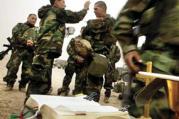Loading...
Click here if you don’t see subscription options
Click here if you don’t see subscription options


News
Pope Congratulates President-Elect Barack Obama Pope Benedict XVI sent a personal message to President-elect Barack Obama on Nov. 5, congratulating him and offering his prayers for Obama and for all the people of the United States. Federico Lombardi, S.J., the Vatican spokesman, said that because th

Can pastors in the military serve God and government?

The case for selective conscientious objection

Letters
Dotcom I was most grateful for the article by George M. Anderson, S.J., about my play and DVD about Dorothy Day, “Fool for Christ” (Of Many Things, 11/3), but there was a misprint that I think needs to be noted.The last part of my Web site address was given incorrectly. It should have re

In All Things
A poll released today by Public Religion Research and sponsored by a coalition of progressive faith-based organizations has some surprises about the role faith played in the 2008 presidential election and how faith voters are approaching the country rsquo s challenges Not surprisingly religious

In All Things
nbsp From The New York Times by Victoria Burnett AP a surprising development in a case that has great meaning for many of our readers and our editors as well Nearly 20 years after the Salvadoran Army killed six Jesuit priests in one of the most notorious events of El Salvador s civil war a

The Good Word
Mark gives us Jesus third passion resurrection prediction it seems reasonable to say that Mark had an eye on what he will soon report about the passion of Jesus as he gives us more detail about Jesus sufferings Again we note that here as in the earlier predictions Jesus asks his disciple

In All Things
How do you ldquo recant rdquo and begin to believe something you don rsquo t believe The Vatican Congregation for the Doctrine of the Faith or CDF is ordering Father Roy Bourgeois M M to recant his belief and support for women rsquo s ordination If not he will be excommunicated in thirty days

In All Things
Thomas Reese SJ and Peter Steinels both conclude that in the aftermath of Tuesday rsquo s elections results the U S Catholic bishops rsquo political prestige suffered greatly not least because the very pro-choice Barack Obama won a majority among Catholic voters Fr Reese said the bishops rsq
